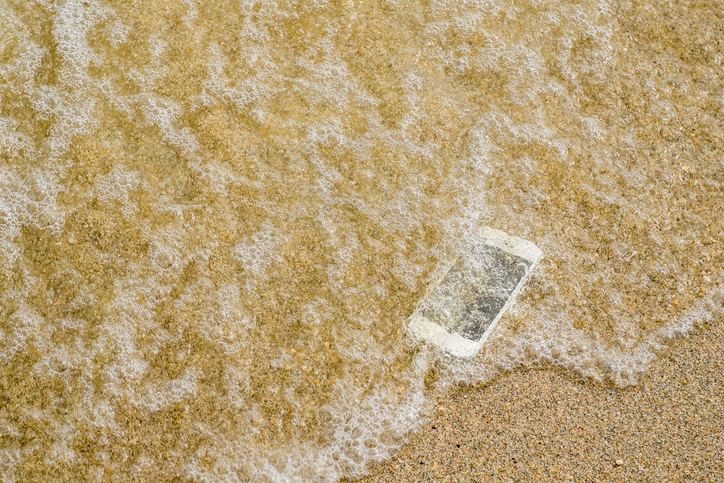Yesterday I almost threw my phone into the ocean.
I wasn’t feeling particularly overwhelmed by digital stimulation in that moment or anything, it was just a strong feeling that came over me while I was standing on Ocean Beach Pier, staring down into the waves.
Throw it. Throw it.
The only reason I didn’t was because a second voice in my head said, “Jenny, only an insane person would do that.” So I didn’t. But I wanted to.
Truth be told, it wouldn’t have been a totally new experience. When I was 25, I threw my pink Motorola Razr phone into a trash can on Lexington Avenue in New York City. Just tossed it in as I was walking by, on a whim. I didn’t plan to. I just felt that “throw it” feeling, sick of the constant distraction, and I tossed it in, likely mid-text with a guy. Smiled and kept walking. Take that, overstimulation. (For the record, I’m not saying this was a smart idea, I’m just saying it happened…) And that was before iPhones even came into the picture.
Sometimes I get really rebellious against overstimulation and obligations to rapidly correspond, because on some level it just doesn’t feel natural or healthy to me to be so constantly digitally connected. And this is coming from someone who has made a career out of blogging. We’ve been trained to expect everything immediately, to respond right away to every person who contacts us. Instant gratification is expected in every situation. (Amazon Prime same-day delivery!? Yes please). And our addiction to it is running our lives.
Technology has MANY, many perks, of course, but there’s something that seems unreasonable about how heavy a burden we expect our attention spans and our nervous systems to be able to effectively handle.
One thing I’ve been noticing since I arrived in San Diego from New York City 12 days ago is how little my senses are highly stimulated in any given day here. It’s quieter, there’s a lot of nature, and especially the last couple of days since trying Wim Hof breathing and getting back to TM (not to mention I’ve intentionally taken a 2-week break from watching Bachelor in Paradise…Joel’s suggestion) I’m just feeling…well, mellow. And I think that’s what led to me wanting to toss my oh-so-very-stimulating phone into the waves.
It’s as if I’m on a stimulation detox from New York City, and not really quite sure what to do with it. The general feeling of mellowness actually bothers me a little, because I’m uncomfortable with it. It feels odd and a bit unnerving. Learning to actually relax without guilt can be difficult to ease into. And I think that’s something a lot of people feel, not just New Yorkers.
Of course, a healthy dose of stimulation is a great thing, and we need it. But when nothing we do is ever quite enough, there’s always something more we could be doing…we miss out on being.
So why is just BEING so damn difficult!?
We become addicted to the adrenaline rush of stress and always moving onto the next thing. It’s quite unfortunate, because when we take the time to just be, we notice so much more beauty in the world. In the way the sun shimmers on the ocean, the way a flower or tree branch sways in the breeze. Nature soothes us, if we pay attention. Our phones don’t soothe us.
But we’re always on the hunt for that next hit, that quick fix, that dopamine rush that comes with watching the next episode or receiving that next text or scrolling through that instagram feed. Quick fix, quick fix, quick fix…until we get overstimulated and anxious.
I liked this article: Overstimulation: Taming A Modern Problem That Leads To Anxiety. It cites noise pollution, clutter, multitasking, and the internet as some of the most major sources of overstimulation.
“There’s a growing body of evidence that overstimulation can be a major contributing factor to anxiety, especially for those who are particularly sensitive to external stimuli.”
I thought the noise pollution part was really interesting, and something I hadn’t really considered before.
Noise pollution, from Wikipedia:
“Noise pollution affects both health and behavior. Unwanted sound (noise) can damage psychological health. Noise pollution can cause hypertension, high stress levels, tinnitus, hearing loss, sleep disturbances, and other harmful effects.
High noise levels can result in cardiovascular effects and exposure to moderately high levels during a single eight-hour period causes a statistical rise in blood pressure of five to ten points and an increase in stress and vasoconstriction leading to the increased blood pressure noted above, as well as to increased incidence of coronary artery disease.”
This makes so much sense to me.
Also from the same article on overstimulation:
“Neuroscientist Dr. Daniel Levitin, author of The Organized Mind: Thinking Straight in the Age of Information Overload, believes that constantly checking emails, texts, and Facebook constitutes a neural addiction. Switching tasks literally uses up energy and nutrient stores in the brain leaving you feel exhausted and disoriented.”
It also states that the average American spends 11 hours a day with electronic media.
ELEVEN HOURS A DAY.
That just made me want to cry for our poor overstimulated bodies and minds. The recent rise in the number of float tank centers is so clearly needed.
I did a little more research into sensory overload and what it can do to us if we don’t learn how to chill out.
- Irritability
- “Shuts down”, or refuses to participate in activities and/or interact with others
- Avoids touching or being touched
- Gets overexcited
- Covers eyes around bright lights
- Makes poor eye contact
- Covers ears to close out sounds or voices
- Complains about noises that do not affect others
- Having difficulty focusing on an activity
- Constantly changing activities, never completing a task
- Irritation caused by shoes, socks, tags, or different textures
- Over-sensitivity to touch, movement, sights, and/or sounds
- Has trouble with social interactions
- Extremely high or extremely low activity levels
- Muscle tension
- Fidgeting and restlessness
- Angry outbursts
- Sleeplessness/fatigue
- Difficulty concentrating
More interesting reading: Revenge of the Introverts
I don’t think we’re ever “going back” to a time without incessant technological stimulation, so in order to stay feeling good, we have to learn to make technology work for us, which means using it for it’s awesome power to connect us with anything and anyone in the world, but also taking healthy amounts of time away from it – connecting with ourselves, other humans, and the natural world.

So, how do we prevent overstimulation to the point of throwing our phones into the sea? I think the answer is simply doing anything that takes a bit of patience, quietude, solitude, and doesn’t involve a digital dopamine hit.
Things like…
- Meditation
- Breathwork to calm the nervous system
- Float tanks
- Yoga
- Being in nature
- Human connection and physical touch
- Journaling
- Setting good boundaries
And, perhaps most importantly, putting a strong emphasis on resting and sleeping well.
Just something I’m thinking about these days.
Lots of love and total chill,
Jenny



Mindy says
Wonderful article Jenny! This is something I have been thinking about a ton the last few weeks as well. It made me think of Glennon Doyle Melton’s supersoul talk: https://www.youtube.com/watch?v=BpBnGHjda14&t=27s
She talks about how cell phones have become an “easy button”…a way to hide from feelings & being in the moment. It kind of seems like technology as a whole has become that over the years (I sure know I catch myself doing this plenty). Keep blogging on girl…been so fun to watch your 100 day journey.
Jenny Sansouci says
I am obsessed with Glennon lately! Thank you!!